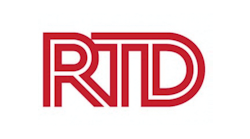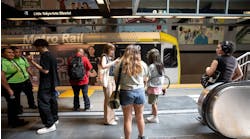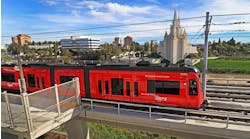Group Tasked with Reviewing RTD Pass Programs Completes its Work
A 25-member group of leaders asked to evaluate and determine whether changes should be made to the Regional Transportation District’s pass programs completed its work Tuesday, drafting a recommendation from its yearlong effort that will be reviewed by the agency’s leadership team and its board of directors.
The working group — convened at the request of the public and at the direction of RTD’s 15-member board of directors — reviewed each of the agency’s individual and group passes and formulated several options, all of which were evaluated by a consultant for their impact on total fare revenue and ridership. As they deliberated, study participants considered eight guiding principles in their work: brand loyalty, convenience, cost-effectiveness, equitable access, increased ridership, an ability to meet strategic budget plan targets, revenue certainty and simplifying rider-operator interactions. RTD’s pass programs last underwent a thorough review in 2009.
“I commend the members of the working group for their thoughtful participation in this important process, and my colleagues and I look forward to reviewing their recommendation,” said RTD CEO and General Manager Dave Genova. “We as an agency want to do all we can to meet the needs of the public we serve. This study is the very definition of public service.”
Working group members have no inherent authority to make changes to pass programs. RTD’s senior leadership team will review the group’s work at an internal meeting in March. The board of directors will receive an initial public update from staff at its next finance committee meeting, on March 13. No board decision is expected on that date. With board approval later this year, the earliest the public could experience any change resulting from the group’s recommendation would be early 2019.
Elements of the group’s recommendation include:
- Adding a low-income pass, which would provide a 40 percent discount to qualifying riders whose incomes are at or below 185 percent of the federal poverty guidelines. This pass effectively serves as an expansion of the existing RTD nonprofit program, which has been in place for decades to assist low-income riders and would be retained.
- Adding a youth pass, which would discount the fare for riders 13 through 19 years old to 70 percent. Individuals 12 years old and younger would ride free with a fare-paying rider.
- Retaining EcoPass, Neighborhood EcoPass and CollegePass and pricing them based on updated service level areas (for EcoPass) and value of the trips taken (for Neighborhood EcoPass and CollegePass). The group is considering phasing in price increases of more than 20 percent for EcoPass holders, neighborhoods and higher education institutions.
The group’s deliberations and modeling presumed that RTD’s board of directors would review fares, as it does periodically, later this year and determine whether to make adjustments to them. That public process – related to but separate from the pass program study – would have any potential changes to fares taking place in 2019. The modeling assumptions from the working group’s recommended option assume 2019 cash fares of $3 for a local trip, $5.25 for a regional trip and $10.50 for a ride on the University of Colorado A Line to Denver International Airport. These specific fares are not being considered by the board at this time. As is the case with the pass program study, any changes in fares would first be reviewed by RTD’s senior leadership team, then approved by its board of directors.



